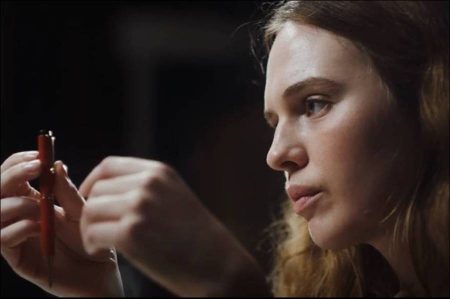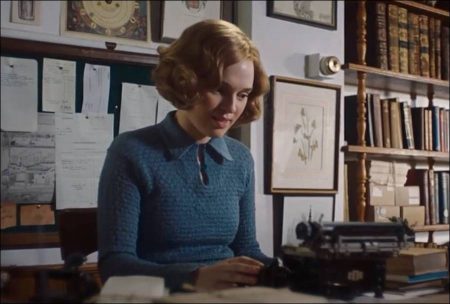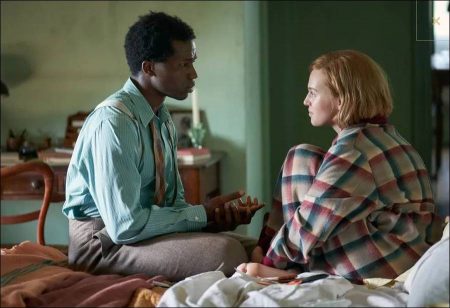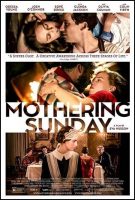Mothering Sunday Movie Storyline. On a warm spring day in 1924, house maid and foundling Jane Fairchild finds herself alone on Mother’s Day. Her employers, Mr and Mrs Niven, are out and she has the rare chance to spend quality time with her secret lover. Paul is the boy from the manor house near by, Jane’s long-term love despite the fact that he’s engaged to be married to another woman, a childhood friend and daughter of his parents’ friends. But events that neither can foresee will change the course of Jane’s life forever.
After treating us to Girls of the Sun in Competition in 2018, director Eva Husson is back with a new film selected for Cannes Première: Mothering Sunday, an intimate ode to secret carnal love in the 1940s.
Known for her first film The Young Lady and for her series adaptation of Normal People, playwright and screenwriter Alice Birch brings us her adaptation of a novel by Graham Swift. French filmmaker Eva Husson, who had already tackled the pleasures of the flesh with her 2016 film Bang Gang (A Modern Love Story) continues in the same vein with Mothering Sunday, the story of two lovers in the inter-war period.
Jane Fairchild (Odessa Young) is an orphaned servant turned writer who looks back on Mother’s Day in 1924, when she met with Paul (Josh O’Connor), her neighbour and lover, when his employers Mr and Mrs Niven (Colin Firth and Olivia Colman) were out for the day. Engaged to another woman, Paul indulges in his secret idyll with Jane in the cosy cocoon of the house. Their bodies come together in a tender portrait of vulnerability, as their feelings and memories rise to the surface.
Shot in the throes of the pandemic in full compliance with sanitary measures, Mothering Sunday is a slice of romance offered up in a time marked by loss and grief. Flashbacks and glimpses of other times are layered over the here and now of the couple’s embrace, a timeline made up of dreams and memories. Eva Husson films as close as possible to her actors, capturing the sensuality between two people whose love conquers all, drawing the audience into their secret world built for two.
Mothering Sunday is a British drama film, directed by Eva Husson, from a screenplay by Alice Birch, based on the novel of the same name by Graham Swift. It stars Odessa Young, Josh O’Connor, Olivia Colman, and Colin Firth. It had its world premiere at the Cannes Film Festival on 9 July 2021.
Film Review for Mothering Sunday
An English woman looks back over her life and remembers the key moments — especially one fateful sultry day in 1924 — that made her into the acclaimed writer she would eventually become in this sensual but structurally flawed period drama.
Adapted from Graham Swift’s lean but bravura 2016 novella of the same name, Mothering Sunday delivers beautifully when it comes to evoking the deliciously painful throb of a secret affair, in this case between housemaid Jane Fairchild (Odessa Young, recently seen in Shirley and Assassination Nation) and a wealthy son of a neighboring family (Josh O’Connor, The Crown). Sharply faceted but small caret turns from Colin Firth, Olivia Colman and the great Glenda Jackson, the last playing Jane as an elderly woman, further adorn a posh package that should appeal to older viewers who swoon for Downton Abbey‘s mix of frocks and manners and a younger demographic that likes a more carnal blend of romance and riches, as in Netflix series Bridgerton.
Taken with her previous, sexy-time-rich portrait of young people in the throes of passion, Bang Gang: A Modern Love Story, this new film from French director Eva Husson (who also made misfire Girls of the Sun) further demonstrates an enthusiasm for refracting character through intimacy, especially from a largely female point of view. However, even the lush world-building of the visuals here, committed performances especially from Young, and stream-of-consciousness editing aren’t enough to conjure the wry, melancholy, and, above all, intensely literary interior voice of the book’s protagonist. It’s that distinctive voice, expressed through an adroit use of free indirect style, that earned the original work acclaim — not the bare-bones plot, which, when rendered down to its essence, is basically straight-up melodrama.
But the film’s venerable producers Elizabeth Karlsen and Stephen Woolley (Carol, The Crying Game), Husson and screenwriter Alice Birch (author of Lady Macbeth, as well as the recent TV adaptation of Normal People and episodes of Succession) have elected to eschew the currently unfashionable device of voiceover narration, which would have offered some taste of Swift’s prose style. Consequently, they’re left with no other way to limn their heroine’s interiority except by force-feeding the story, as to a goose reared for foie gras. That means expanding the scope far beyond the narrow day-in-a-life microcosm of the original, giving only passingly mentioned events flash-forwarded to in the book — like Jane’s brief marriage in the 1940s to a philosopher named Donald (Sope Dirisu, from His House) — substantial chunks of screen time.

Even readers who don’t know the novella are likely to sense something has been diluted or unbalanced by that broadened scope. In the end, it becomes the story of a sexually confident woman who has two different relationships and then sits at a typewriter a lot in fantastic period duds in shades of red and blue courtesy of ace costume designer Sandy Powell.
We don’t even get to see or hear anything she writes, apart from literally a few words noisily typed onto a page. It’s not exactly enough to persuade us that Jane turns out to be a world-class novelist on par with Doris Lessing (one of the story’s biographical inspirations) — although given the semiotics of star casting, we should probably infer that she must have been good enough to earn being played by Glenda Jackson. Sadly, we get only a sliver of the fragile but still gloriously haughty Jackson, like a wafer of bitter dark chocolate after a meal.
That last-act diminuendo is a real dynamic shift from the brightness of the first half hour or so, set in 1924. It’s here that we meet Jane, a canny lass raised in an orphanage, who, unlike her friend Milly (Patsy Ferran), the kitchen maid, has no mother she needs to visit on the Mothering Sunday of the title (the precursor to today’s Mother’s Day, when posh people gave their servants a day off to visit family). As her employer Mr. Niven (Firth) notes as he gives her a tip to spend as she likes, this allows her a sort of freedom to enjoy the day as she pleases.
Jane, it turns out, will be well pleased indeed as she sneaks off to spend the morning getting naked and sweaty with her lover Paul Sheringham (O’Connor). Used to having their trysts in barns and stables judging by a couple of flashbacks, the two have a chance to get it on in a real bed because his parents (Craig Crosbie and Emily Woof) are headed to Henley to have lunch by the Thames with Mr. Niven and his wife Clarrie (Colman). Joining that quartet is the Hobday family, which consists of a husband (Simon Shepherd), a wife (Caroline Harker) and an imperious but impeccably coiffed daughter Emma (Emma D’Arcy).
Paul is supposed to be marrying Emma in a fortnight’s time, and there’s an unspoken sense that both he and Jane know this will probably be the last time they can have sex. But while he isn’t exactly rushing to get to lunch on time, there’s nothing despairing or even unhappy about his and Jane’s liaison. They both understand the rules of this world, and that means there is no Cinderella-style ending for maids who give themselves to high-born gentlemen. Pleasures must therefore be snatched whenever possible, especially since they both live in a world where only a few years ago both of Paul’s older brothers (one of whom was to marry Emma originally), the Nivens’ two sons and Milly’s sweetheart were all killed in the trenches of WWI.
Shot in 2020 in the lull between pandemic lockdowns, Mothering Sunday has the shadow of death hanging over it in multiple ways, within the story itself and in a more meta sense. This makes the young lovers’ frenzied coupling seem sex-positive and life-affirming, especially when contrasted to the heartbroken faces of the older people at lunch; Firth and Colman in particular subtly suggest, through haunted looks and quavering line deliveries, the unbearable pain of bereaved parents.
Jane, at this point in her life, is free of that pain too, and she strolls around Paul’s family’s empty mansion once he finally leaves for lunch without a scrap of clothing encumbering her. Projecting an unapologetic confidence and ease within her own skin, Young makes the character’s frequent nudity feel entirely comfortable, even sort of glamorous, an insouciance well-matched by O’Connor, who is likewise clearly comfortable with on-camera full-frontal. It’s flawed, but this may be one of the sexiest heterosexual period dramas in some time.
Mothering Sunday (2022)
Directed by: Eva Husson
Starring: Odessa Young, Glenda Jackson, Josh O’Connor, Olivia Colman, Colin Firth, Sope Dirisu, Craig Crosbie, Emily Woolf, Simon Shepherd, Caroline Harker, Emma D’Arcy
Screenplay by: Alice Birch
Production Design by: Helen Scott
Cinematography by: Jamie Ramsay
Film Editing by: Emilie Orsini
Costume Design by: Sandy Powell
Set Decoration by: Hannah Spice
Art Direction by: Solomon Honey, Louise Lannen, Adam Marshall
Music by: Morgan Kibby
MPAA Rating: R for sexual content, graphic nudity and some language.
Distributed by: Sony Pictures Classics
Release Date: July9. 2021 (Cannes), March 25, 2022
Views: 173





